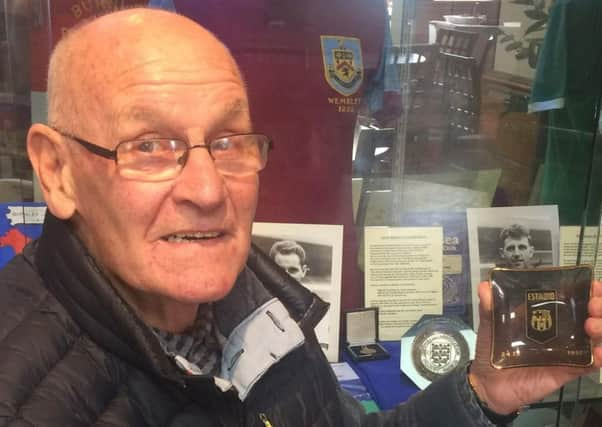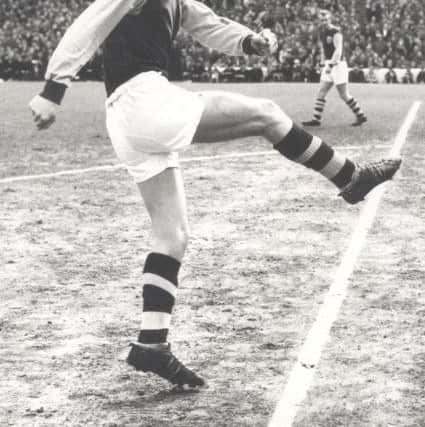Clarets legend's European memories - Jimmy Robson speaks to Dan Black as he recalls Burnley's adventures in the Champions' Cup in 1960/61


The rich tapestry of Burnley’s bygone days play out in front of him as the former inside-forward reminisces about an era when the Clarets, under Harry Potts, were the champions of England.
Of course the archaeology of the stadium has transformed substantially since those halcyon times a generation or two ago but the expression of content etched across the 79-year-old’s face suggested that the re-designed landscape hasn’t tampered with his recollections.
Advertisement
Hide AdAdvertisement
Hide AdRobson totalled 202 appearances for the club, scoring 79 times, but it was one goal in-particular that we were waiting to hear about, one that he could clearly picture when turning his head to the right hand side from the Bob Lord Stand.


That’s because Robson, who made his professional debut on the same day that Bobby Charlton made his bow for Manchester United, was the scorer of Burnley’s first goal in continental competitions.
It came against French champions Stade de Reims in the European Cup, now known as the UEFA Champions League, taking less than 60 seconds for Robson to beat René-Jean Jacquet in front of the Bee Hole End.
Brian Miller’s diagonal pass was headed out to John Connelly by Frenchman Bruno Rodzic and the former England international hooked a pass in to Robson to score.
Advertisement
Hide AdAdvertisement
Hide Ad“We went to the cup final, we won the league and we played in Europe,” said Robson, who clarified that the Clarets won the first leg 2-0 thanks to McIlroy’s strike. “What we did for a town team was tremendous.
“There are many good memories. We played Reims and Hamburg at home and there was 40-odd thousand on so the atmosphere was good.
“I scored against Reims, in the inside left position down at the Bee Hole End. I was down there and I stuck it in the back of the net. It was as simple as that. It was a good start.
“Reims were a good side, they had quite a few French internationals. They had (Raymond) Kopa, Just Fontaine, they didn’t play together thankfully, one played at Burnley and one played in France.
Advertisement
Hide AdAdvertisement
Hide Ad“It was a godsend they didn’t play together, I think they were injured at that time.”
Robson would often deviate from the subject, regaling us with colourful anecdotes and tales of the club’s most successful spell in its history.
Softly spoken with a north eastern twang, transfixing his audience, Robson reflected on the title-clinching game against Manchester City at Maine Road, the influence of Potts and the FA Cup run of 1961/62.
But after circumnavigating those topics, ones that he felt indubitably passionate about, the conversation returned to its starting point.
Advertisement
Hide AdAdvertisement
Hide AdRobson modestly glosses over his crucial opener at the Parc des Princes in Paris in the return leg as Burnley progressed 4-3 on aggregate.
Instead, he shared the story of the “gaffer” whose behaviour in the French capital seemingly antagonised the locals.
“I always tell the tale of when we played Reims,” he said, with a wry smile on his face. “They were putting pressure on when we were playing in Paris, they moved it so they could get more Frenchmen shouting for them, which they did do, and they kept throwing the ball about, gaining about 10 yards from free kicks.
“They were putting balls in to the box and we were having trouble clearing them. They kept doing this and Harry was stood on the touchline.
Advertisement
Hide AdAdvertisement
Hide Ad“They threw it forward in front of him and he ran on and kicked it 10 yards further back, which was right.
“The next thing we saw was Harry getting marched off by the French police and all the fans were climbing up the metal surrounding the pitch, trying to get over to have a go at Harry.
“Fortunately he was in the dressing room after but I’m not sure where he watched the game from. He congratulated all the lads.”
Burnley’s story was one romanticised by the working class roots of the players. Robson was among a cohort of players still employed on a part-time basis, operating at Bank Hall Colliery.
Advertisement
Hide AdAdvertisement
Hide AdRobson had been earning up to £7 per week at the start, living a double life as he worked in the mines.
On a matchday he would be known to go to the pit at 7 a.m. and work until 3 p.m. before playing in the old First Division in the evening.
He said: “Some of us were part-time, there was Adam Blacklaw, John Connelly, myself and Brian Miller, we all worked at the pits, most of us worked at Bank Hall, we worked in the shops, we didn’t go down the pits.
“You had to go and get your own brew, they had a big tea urn and you’d queue up and if you’d had a bad game on the Saturday you could hear them whispering behind ‘he doesn’t deserve a cup of tea’.
Advertisement
Hide AdAdvertisement
Hide Ad“We were all in the same boat, some used to get more stick than others, I was in the front row regards getting stick.
“They were big colliers, you didn’t say anything to them, you just accepted it.”
Even more remarkable then that this group of players would match some of football’s Goliaths, going within the width of a post of securing a semi-final tie against Barcelona.
Robson scored again in the 3-1 defeat of Hamburg at Turf Moor with winger Brian Pilkington getting the other two.
Advertisement
Hide AdAdvertisement
Hide AdBut star man Uwe Seeler, regarded as one of the greatest players in German football history, found the net twice in a 4-1 win at Volksparkstadion as they progressed 5-4 on aggregate.
“Gordon Harris scored away from home,” said Robson.
“I remember that because it was a good shot from about 20 yards out.
“That put us back in the lead to make it 4-3 and then Jimmy McIlroy hit the post with a few minutes to go. That was it then - we were out.
“They had a good side, but Reims were a better footballing team.
Advertisement
Hide AdAdvertisement
Hide Ad“Uwe Seeler threw himself about, there were diving headers and things like that. We’d had previews of matches that he’d played in, Harry had got some footage and it just showed him scoring goals, he was scoring diving headers and all sorts, he was getting his head on things.
“He scored against us very early on.
“We knew he was a threat. We would have played Barcelona in the semi-final, they beat Hamburg in the end.”
Those European nights remain some of the greatest moments in Robson’s life, a break from the norm, an escape from the bustling mill town.
Bob Lord was caricatured in Arthur Hopcraft’s book The Football Man as ‘the Khruschev of Burnley’, but Robson saw a different side to the club’s chairman.
Advertisement
Hide AdAdvertisement
Hide Ad“We stopped in one hotel, it wasn’t up to scratch, Bob immediately took us out and got us another hotel somewhere else and it was a much better hotel,” he said.
“He was good to the players, he travelled with us more or less everywhere and he made sure we had the best, he wasn’t shy in spending his money to make sure we had the best.
“We liked him, you didn’t have conversations with him but he was good to the players.
“In Europe there was no expense spared, Bob looked after us, we had the best hotels, everything was spot on, we flew to the games, we went for walks around the cities. Playing in Europe was special.”